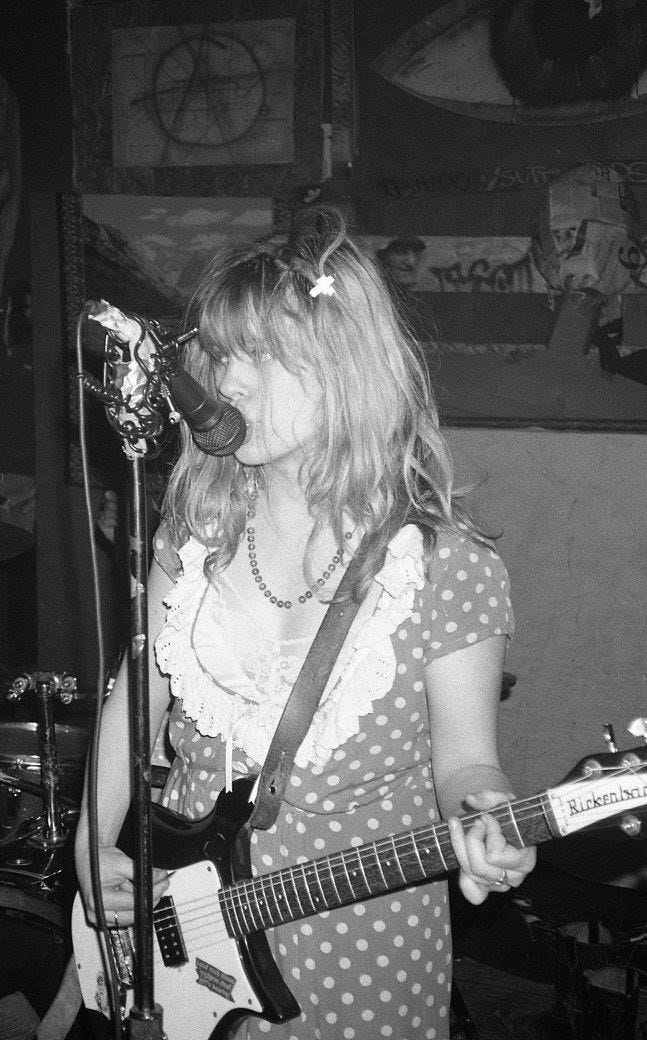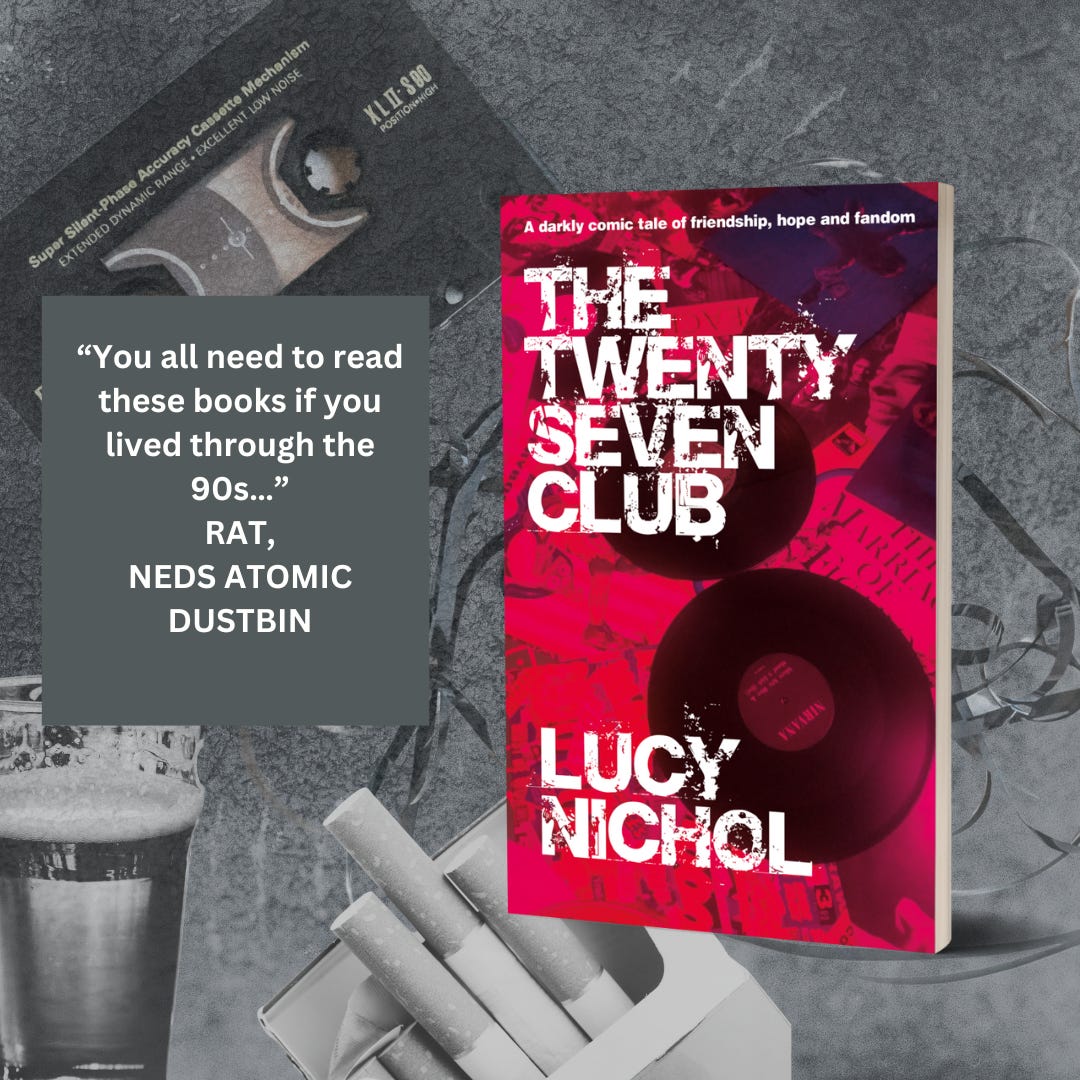Finding your teenage tribe
The ultimate confidence boost for a shy and awkward teenager with bad teeth!
I was 14 years old and on holiday with the family, listening to my cassette tapes through my crappy walkman and feeling as though I had to make a choice. Was I going to finally ditch those rave tunes in favour of Nirvana, Sonic Youth, Hole…
I was listening to both. Each side of the cassette tape had ridiculously opposing music. Ratpack were searching for their rizla on one side, and Courtney was looking to get loaded on the other (well….I guess you could say they had *some* things in common).
I chose Nirvana and co. Although I decided that a peppering of the Prodigy was still respectable and welcome.
But I got more than simply acceptance from my new friends and great music that I’d still be listening to 30-odd years later. I started wearing a new ‘badge’. I was part of a tribe. And that meant that, no matter how bad my teeth, my skin, my lacklustre teenage hair, I would be able to show the world something else about me before all the bits that made me so excruciatingly self conscious.
I’ve been working with Bethlem Gallery recently promoting its Live Lounge exhibition (if you’re in London do check it out - it’s lots of fun and FREE!). As part of this, Professor Sally Marlow of King’s College London has been talking to me about why the music of our youth is so important to us. She talked about how it serves as a ‘badge’ and how it plays a huge part in our friendship groups and connections. But I think the ‘badge’ concept is really interesting for many reasons.
I was very shy and awkward and I had TERRIBLE teeth (train track braces were an absolute MUST for me) so I wasn’t particularly outgoing. And you might think that if you’re not all that confident you would probably dress down so as not to be noticed.
But the thing is, when you find your tribe and a way to express yourself as part of that tribe, you are showing the world your music taste and community before you show them your teeth (sadly, there aren’t any pictures of me in my more interesting teenage threads - no camera phones - so it’s just teenage me in woolly cardies and jumpers on this page sadly).
You see, I felt far more comfortable dressing a little bit differently to all my school mates because I thought it would hide my teeth, my bad hair and my actual shyness. I thought this imperfect way of dressing would soften the bits of me I didn’t like - and pronounce the (very few) bits of me I did - my interests, my teenage love of art and new taste in music. And I thought it might make me more interesting. I mean, I was convinced there had to be *something* interesting about me - but the shyness stopped whatever it might have been from coming out.
Courtney Love and Kat Bjelland fascinated me. And yet they were not exhibiting the standard, wholesome ‘pretty girl’ look that was all over our TV screens at the time (90210, Baywatch, etc). But they looked great.
So buying second hand dresses in off white with lace and blue ribbon, white fish net tights, blue velvet flares and pink 70s shirts was part of my new passion. Part of my new ‘me’. And while I remained shy for a couple more years, I started to gradually come out of my shell a little.
I’m never going to be standing on stage and authentically screaming into the mic about being a teenage whore or whatever. And back then, if you imagine a young girl living in a village called ‘Cherry Burton’ who had to hide her cigarettes from her parents for fear of getting grounded you’d see that there was no way I was even remotely ‘punk’. But finding that music and that ‘tribe’ was hugely significant to me. The girlfriends I made back then are still my closest friends, I still listen to the same music (albeit with newer stuff added to the mix) and I am LOVING the 90s re-vamp that Urban Outfitters continue to push (you’re never too old to wear it again in my view).

I think it feels kind of contradictory on a surface level when you think about shy people dressing in a way that makes them stand out. But when you think a bit more about it, it actually makes a lot of sense.
Here’s an extract from my 90s novel The Twenty Seven Club about Janis Joplin on the same subject (NB - this is written from the point of view of a fictional fan - NOT a music expert!):
Extract - The Twenty Seven Club
I think I always loved Janis as a kid because of how colourful and theatrical she looked. I had similar feelings about Adam Ant and Boy George as a teenager – but Janis was something else. The feather boas in her hair, the beads and flared trousers. I remember being sent to Brownies dressed as Janis and Brown Owl wasn’t overly impressed – I couldn’t understand why.
I remember reading that Janis was voted ‘ugliest man on campus’ in college. Have you seen her? Have you heard her? There’s simply nothing ugly about Janis. I kind of related to it though, because I was always given grief in school after Mum left. Dad wasn’t especially good at doing my hair – although he did try at first – but eventually he just started asking the hairdressers to cut it short. And I didn’t miss the pain of him getting lumps of my hair wrapped around his fat fingers and my little hair bobbles. Ouch.
However, it wasn’t just my hair being cut short. My wardrobe wasn’t regularly updated, so half-mast trousers were standard issue. I was told I looked like a boy on a daily basis.
I think that’s probably where my Dr Martens, knackered old dress and cardies look came from when I think back. I never felt particularly comfortable in a pretty dress and ribbons. Not that I wanted to blend in. Far from it. I can feel far more relaxed in something a little outlandish because then it’s not really me, is it, that they’re staring at. It’s just a look. You can hide behind a look. Did we see the pain in Janis’ eyes, or did we see the feather boas?
And besides, surely anyone would feel far more comfortable being criticised for being a bit out there rather than being criticised for being dull or quiet? We often confuse being ‘out there’ with confidence and happiness, when in many cases, it’s the exact opposite.
If you fancy grabbing a copy of The Twenty Seven Club - a darkly comic novel exploring music myths and mental health - or indeed its follow up, Parklife, about addiction, friendship and recovery, click here.







